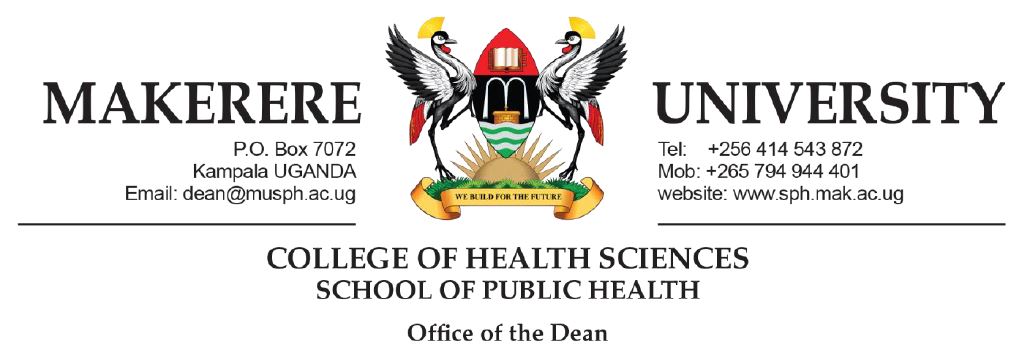PROGRAM COORDINATOR – Lab Leadership Program: Expired!
Job Advert: Makerere University School of Public Health: Deadline: April 1, 2022, at 5PM

JOB ADVERT
Makerere University School of Public Health has received funding from the US Centers for Disease Control and Prevention (CDC) for a Laboratory Leadership Program at the Ministry of Health/ Uganda National Institute of Public Health (UNIPH) The Project seeks to fill the following position.
1. PROGRAM COORDINATOR – Laboratory Leadership Program
Reports to: Program Director – PHFP
Direct Supervisory roles: Field Supervisors – Laboratory Leadership Program (LLP)
Background
The Laboratory Leadership Public Health Fellowship Program (LL-PHFP) is a field-based training program to develop laboratory leaders in Uganda. It is focused on building competencies in key areas of laboratory leadership among promising young scientists through a two-year fellowship. Competencies are in the areas of laboratory systems and infrastructure, leadership, laboratory-based disease surveillance and outbreak investigation, laboratory quality management systems, policy and program management, and communication, at a minimum. Some of these will overlap with the existing Epidemiology PHFP (EPI-PHFP). Like the EPI-PHFP, the LL-PHFP is based out of the National Institutes of Public Health (NIPH) in Uganda.
The LL-PHFP fellowship is based at selected host laboratories, where fellows are expected to spend at least 75% of their time carrying out fellowship-specific deliverables in service of the Ministry of Health and their host sites. They also receive didactic training 25% of the time or less. Graduates are meant to have a clear career path planned in the public health sector, with the ultimate goal of strengthening the laboratory systems and management in Uganda. The outline of a curriculum was developed in 2017 by the Association of Public Health Laboratories in consultation with laboratory leaders in Uganda, the U.S. Centers for Disease Control, and the staff of the Epidemiology track of the Public Health Fellowship Program (EPI-PHFP). However, the program did not launch due to funding challenges.
In 2022, the LL-PHFP is expected to complete its curricula, finalize host sites, and enroll its first cohort of fellows. The program coordinator will be responsible for overseeing and/or developing each of these activities and ensuring that an initial cohort is enrolled by January 2023.
Job Summary
This position coordinates the LL-PHFP and field operations of the LL-PHFP. The position assists the Program Director – PHFP in the day-to-day management, planning, administration, monitoring and organizing activities of the LL-PHFP. The coordinator will lead the LL-PHFP fiscal planning, budgeting, administration and reporting activities in compliance with respective program policies, practices, procedures, rules and regulations of
the US Centers for Disease Prevention and Control (CDC), the Government of Uganda (GoU) through Ministry of Health, and collaborative partners/institutions. Specifically, the incumbent participates in resource planning and mobilization, work plan development, and administrative management of the program including day-to-day running of lab fellowship activities.
Key Duties and Responsibilities
- Work with external consultants to review existing lab leadership program curricula, revise for Uganda
- Identify and coordinate the field placements for fellows at agreed-upon host sites
- Develop a program handbook for fellows, supervisors, and host site mentors about processes and expectations
- Work with stakeholders to identify and train mentors for the first year’s cohort
- Use appropriate project management tools to plan, review and track progress on project implementation as well as on the utilization of project resources
- Represent the project in coordination and cluster meetings as well as IP meetings
- Serve as a link between the LL-PHFP and the MoH, host institutions, and NIPH to identify desired projects and activities, ensure adequate mentorship, and access to learning resources (including data) from hosting departments/institutions
- Develop/ review and implement a system of ongoing evaluation of fellow’s outputs and field activities
- Support the development of the LL-PHFP track curriculum in liaison with the relevant NIPH staff and laboratory experts
- Plan for and ensure accreditation of the LLP
- Attend presentations conducted by Fellows as and whenever they are arranged and participate in providing feedback to Fellows
- Participate in review and approval of Fellows’ scientific products including abstracts, manuscripts, proposals, and reports of special studies
- Coordinate and ensure timely scheduling of the annual LL-PHFP conferences and Fellows’ final graduation event, during which they are expected to present their work as ‘stories’
- Allocate mentors to Fellows and evaluate their performance
- Participate in quarterly visits to Fellows at the host sites and evaluation of Fellows’ progress through reviewing quarterly host mentor evaluations; quarterly reports and attending joint quarterly review meetings
- Participate in fundraising and resource mobilization initiatives for the NIPH including proposal writing, among others, to ensure program sustainability
- Attend PHFP and NIPH meetings
- Any other duties that may be assigned from time to time by the supervisor
Qualifications
Master’s degree in a medical field is required
- A Master’s degree in a medical laboratory field is an added advantage
- Must be registered with the respective professional council and hold a valid practicing license with proven record of research and publication
Skills and Experience
- At least At least 3 years’ experience as a laboratory scientist in a reputable organization/ institution with adequate experience of field supervision, mentorship, and coaching of trainees OR 2 years in clinical practice for medical degree holders
- Experience in management, leadership, and administration of laboratory-based programs either through clinical practice, teaching/academic institutions, or research and implementation science or both
- Strong biases in project design and the use of continuous quality improvement (CQI) projects for improvement of service delivery in public health and clinical settings
- Experience working with International or local development agencies. Working with the US government will be an added advantage.
- Strong report writing and research conduct skills, data analysis and presentation competencies
- Be adaptable and willing to travel and stay in the field for long periods of time


Comments are closed.